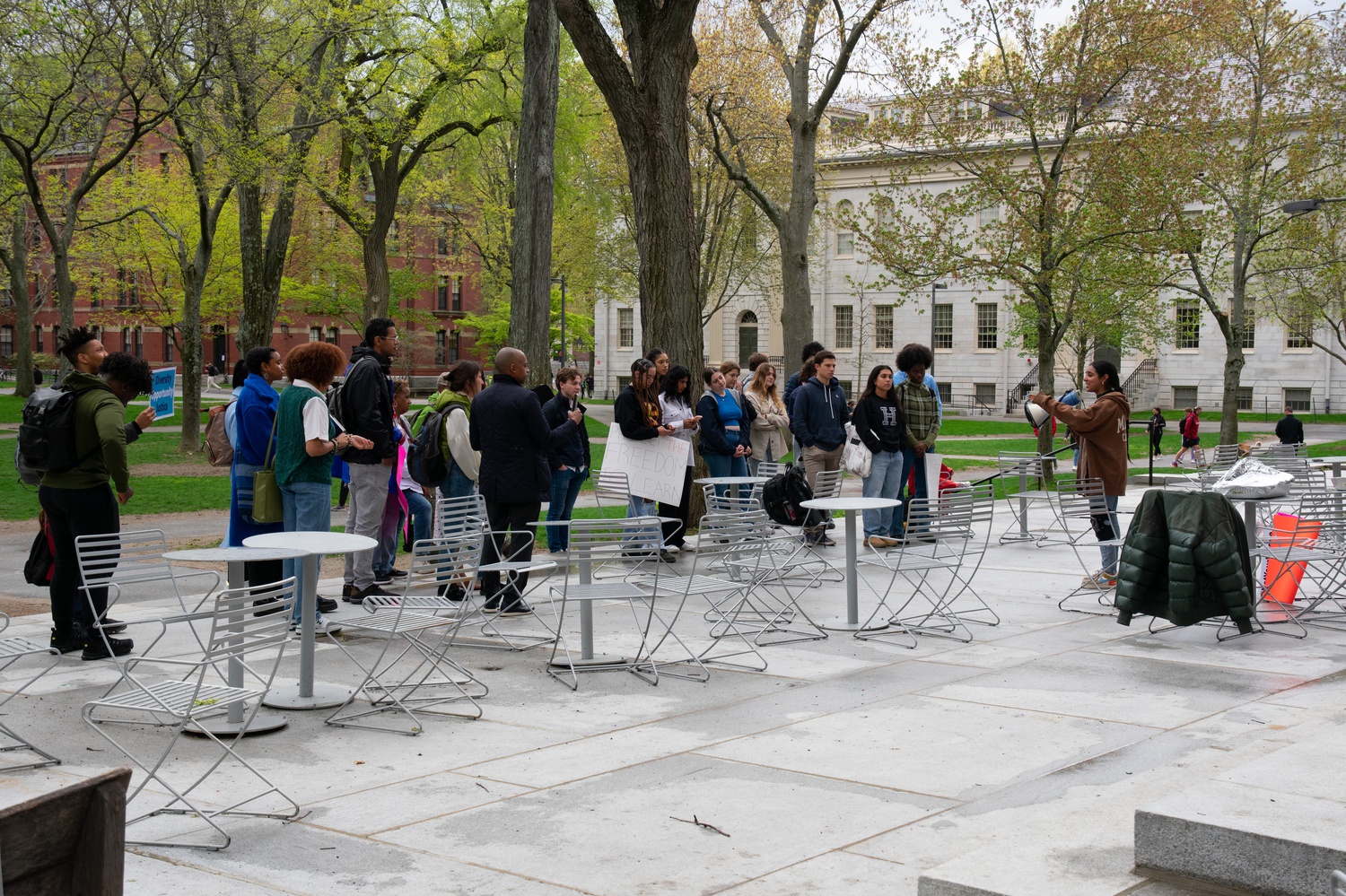
News
‘Deal with the Devil’: Harvard Medical School Faculty Grapple with Increased Industry Research Funding

News
As Dean Long’s Departure Looms, Harvard President Garber To Appoint Interim HGSE Dean

News
Harvard Students Rally in Solidarity with Pro-Palestine MIT Encampment Amid National Campus Turmoil

News
Attorneys Present Closing Arguments in Wrongful Death Trial Against CAMHS Employee

News
Harvard President Garber Declines To Rule Out Police Response To Campus Protests
Harvard Affiliates Protest Book Bans, Laws Against Critical Race Theory

Roughly 30 Harvard affiliates rallied on the steps of Memorial Church Wednesday afternoon to denounce the banning of books and the elimination of educational curricula on queer theory, gender theory, and critical race theory in parts of the United States.
The protest, held as part of a national day of action to support the “Freedom to Learn” campaign, was organized by Harvard Kennedy School professor Khalil G. Muhammad and Anoushka Chander ’25. Muhammad served as one of the national organizers for Freedom to Learn, which held at least 150 events in 30 states around the country on Wednesday.
Tarina K. Ahuja ’24, a speaker at the rally who organized against efforts to ban critical race theory in her home state of Virginia, said restricting discussions of race and gender in the classroom will impact more than just the quality of the education that students receive.
“The attacks that we’re seeing across the country, they’re not just attacks on our education, but they’re attacks on our stories, on our history, on our livelihoods, on our people,” she said.
“These are attacks that we cannot allow to keep happening,” Ahuja added.
Legislation or executive directives that limit the teaching of race and gender in schools exist in 18 states, including in Oklahoma, Texas, and Virginia. More could soon join that tally, as at least nine state legislatures around the country have introduced bills that, if passed, could limit the teaching of critical race theory.
“Legislatures have been seeking to censor our classrooms, ban books, and make sure that students of color do not feel safe in these classrooms,” Ahuja said. “But we, again, will not and cannot let them.”
Muhammad criticized Florida Governor Ron DeSantis’ decision earlier this year to ban the College Board’s Advanced Placement African American Studies course in the state. He was one of 200 African American Studies faculty in higher education to sign an open letter criticizing the ban in February.
The rally also featured readings of passages from books banned in parts of the country. Mariah M. Norman ’25, a co-founder of the Black Arts Collective, read a passage from “The 1619 Project,” a book banned for centering the legacy of slavery in its account of U.S. history.
“I wanted to read a passage from this today because — with this specific project being as banned as it is — I feel like it’s very reflective of a hesitance from legislators to allow our children to know the truth and to defend our history in a way that is reflective of how we, as a country, were born,” said Norman, a Crimson Magazine editor.

Muhammad, who teaches a mandatory course on race and racism for master’s of public policy students at HKS, said in his speech that historically, Harvard has taught propaganda and misinformation in response to societal pressures.
“We know that the oldest, most prestigious university in this country has also told its fair share of lies,” he said. “It has told the stories of the inferiority of people of Indigenous ancestry, of African ancestry, of women, and countless others who have come to these shores in search of opportunity and yet have been the subjects of analysis about who they are and who they aren’t, and whether they belong or don’t.”
“So this problem is an old problem,” Muhammad added. “And this problem isn’t just in the backwaters of rural counties.”
Last year, Harvard released a report detailing its extensive ties to the history of slavery, including the ways in which Harvard scholars and leaders in the 19th and 20th century “promoted ‘race science’ and eugenics and conducted abusive ‘research,’" the report said.
Muhammad told the crowd that to combat bans on critical race and gender studies, they will need to inspire others to join them in defending the truth.
“The problem of misinformation, the problem of anti-truth — or what I call organized and legislated lies — is a problem fundamentally of power, the power to control the lives of others,” he said.
“At the end of the day, truth has always been the antidote to oppression. Literacy has always been the most powerful weapon to define your own reality and to take back your own agency,” Muhammad added.
—Staff writer Miles J. Herszenhorn can be reached at miles.herszenhorn@thecrimson.com. Follow him on Twitter @MHerszenhorn.
Want to keep up with breaking news? Subscribe to our email newsletter.
